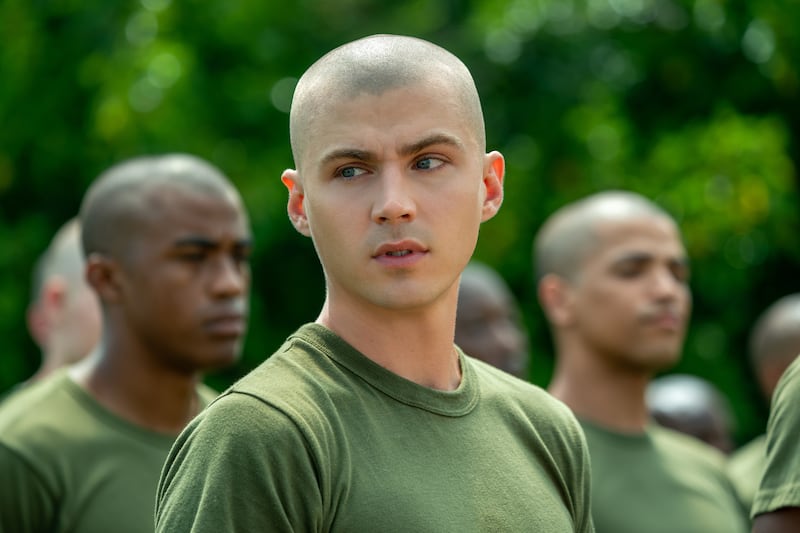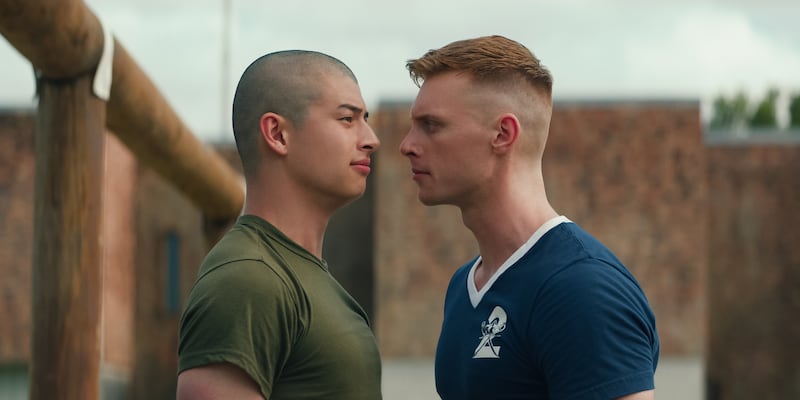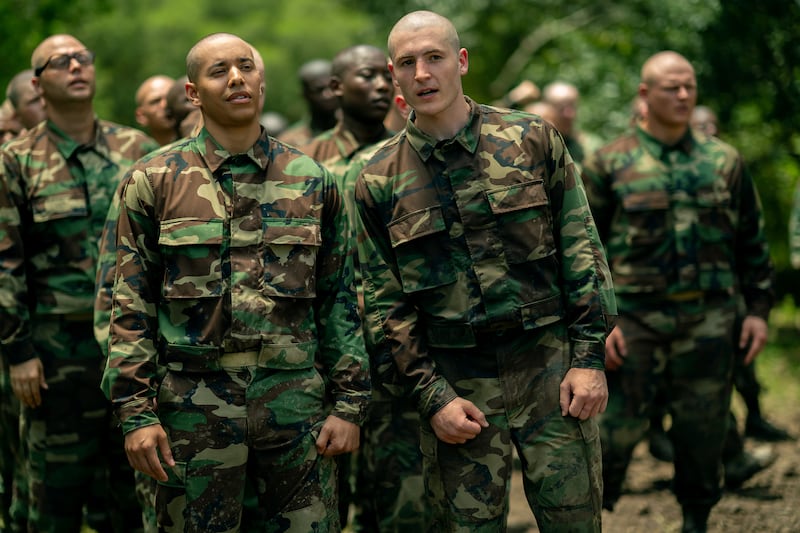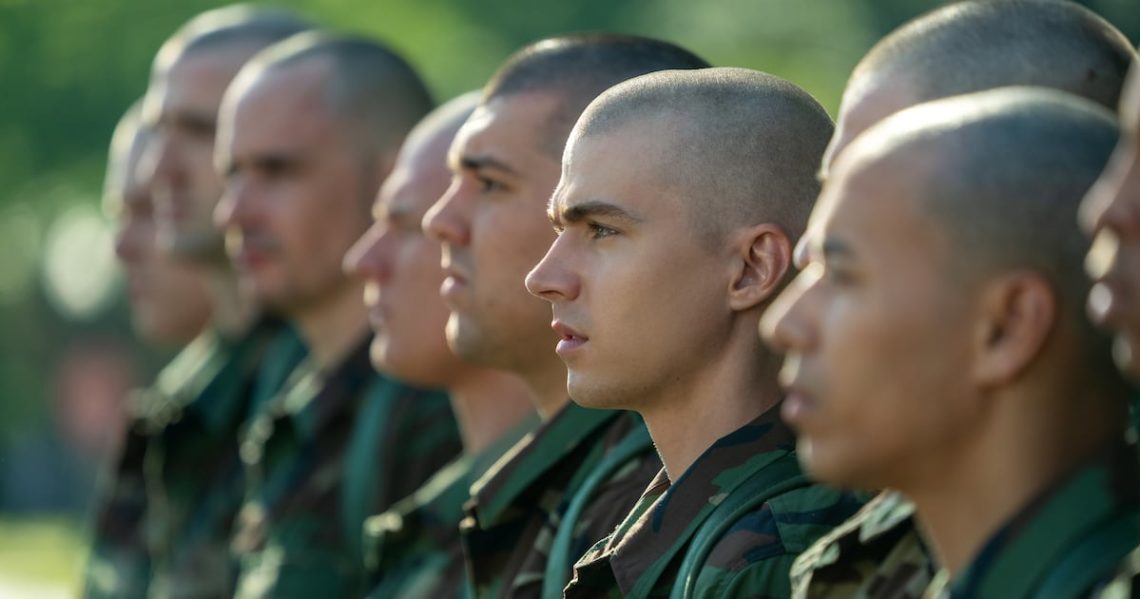Late into Boots, two young Marine recruits joke about how, when you think about it, military culture is pretty damn gay. Spending all day surrounded by literal swinging d—s? Check. Being ordered to “mount?” Check. Calling shirts “blouses?” Check.
“The only thing the Marines don’t supply us with is lube,” one quips.
On paper, Andy Parker and Jennifer Cecil’s (The Umbrella Academy) new Netflix series is an intriguing proposition. We’re living through a time of ultra-heightened gender anxiety, so the military—the face of textbook good ol’-fashioned American masculinity—could be a fascinating setting for exploring who gets to be considered “man enough” in this country, and the costs of being that at all.
In reality, Boots—which was inspired by gay veteran Greg Cope White’s 2016 memoir The Pink Marine—struggles to live up to the “comedy” side of its dramedy title, creating a milquetoast coming-of-age story whose ultimate veneration of military life comes off queasy in 2025.

The opening moments are far more in line with what you’d expect from one of the last shows executive-produced by the late comedy legend Norman Lear. High school graduate Cameron Cope (13 Reasons Why’s Miles Heizer) questions what being a man even means in voiceover, as a montage of everything from an old educational cartoon of a penis to film stills of gladiatorial fighting flash across the screen.
When Cameron attempts to turn to his family for guidance, his mom (an underused Vera Farmiga) tells him to simply be more masculine, while his brother (Ivan Hoey Jr.) offers much blunter advice: “Don’t be such a dumb p—-y.” These close-up, direct-to-camera addresses evoke Ferris’ fourth wall-breaking monologues from Ferris Bueller’s Day Off, a fitting reference point given that Boots takes place around the same time, in 1990.
As Wilson Phillips’ “Hold On” plays, a jittery Cameron assures the military recruiter in front of him that he wants to join the Marines “because of freedom and America”—definitely not because he’s tired of bullies shoving his head in the toilet.
He doesn’t want to be separated from his best friend Ray (Liam Oh), and without the military, he’ll be stuck following his mom to her new home in North Dakota, with no college fund to speak of. Suffice it to say, Cameron isn’t the most convincing candidate. But the Marines need fresh blood, so within a few minutes, he’s earned a one-way ticket to Jarhead central, a.k.a. South Carolina’s Marine Corps Recruit Depot.

If only the rest of the show had stuck with this irreverent, offbeat comedic sensibility. Once Cameron and Ray enter basic training, they’re thrown into the thick of hazing rituals and barking threats. Bootcamp is filled with bald heads, matching uniforms, and sparse training grounds, a murky visual palette that isn’t helped by Netflix’s infamously flat in-house lighting and staid static shots.
In theory, the ties that Cameron and his fellow recruits forge as they’re put through the mental and physical ringer are meant to be Boots’ heart. Yet the show’s pacing is strangely lopsided, spending several episodes on the boys’ early days at boot camp, interspersed with flashbacks to their rocky childhoods.
After their recruit class is rocked by an unexpected tragedy, Boots races towards their final evaluation. They’re christened brothers for life, but by the time the boys graduate, it’s difficult to shake the feeling that, apart from their deepest traumas and a series of shared quips, we don’t really know them or their relationships at all.
Watching it, I couldn’t help but think of Francis Lawrence’s recent adaptation of The Long Walk, a film that effectively developed the bonds between young men sacrificing themselves on the altar of American exceptionalism over a far shorter runtime.

Scenes of Cameron grappling with his sexuality during a time when it was illegal to be queer in the military are also strangely few and far between in earlier episodes, save a clunky exposition device in which Cameron imagines an “angel on my shoulder” version of himself who explains his thoughts and feelings point-blank to the audience.
Instead, much of Boots’ commentary on the military’s thorny history with queerness comes via the boys’ intimidating teacher, Sergeant Sullivan (Max Parker), who mysteriously left his last post in Guam just after a fellow Marine was outed as gay. Parker’s portrayal of a man who channels his repressed self-hatred into days spent telling green teenagers that his favorite word is “kill” is genuinely unnerving, and the closest the series comes to pulling off convincing emotionality.
Behind the camera, Boots’ creatives do have personal connections to the story they’re trying to tell. Cope White recently told The New York Times that being in the Marines ironically gave him the courage to come out, and Parker nearly enlisted as a closeted recruit himself in the late ’90s.
The show is releasing during another precarious time for LGBTQ+ service members—the Supreme Court allowed Donald Trump’s trans troop ban to go into effect in May, and during Pride Month, the Pentagon stripped gay rights icon and Navy veteran Harvey Milk’s name from a ship. Although Parker told Rolling Stone that he hopes Boots will highlight the “spiritual toll” of such discriminatory policies, he insisted that, hopefully, “people don’t see this show as having a political message.”

But really, how is it possible to tell a non-political military story in 2025? For all of Parker and co.’s protestations, depictions of the U.S. military have always been political, even more so during an era in which Americans are more aware than ever of the impacts of U.S. international policy being livestreamed to their phones, and the president is threatening to deploy military troops against American citizens.
Like this year’s controversial A24 drama Warfare, simply putting U.S. troops onscreen is enough to raise valid questions of who Hollywood chooses to center in stories involving the military, and whose voices wind up erased as a result (in one particularly tone deaf moment, Cameron recalls comparing boot camp to summer camp upon learning that he might be deployed to serve in the Gulf War).
The closest that Boots gets to acknowledging common criticisms of the U.S. military whatsoever is a scene in which Cameron’s flaky mother Barbara confronts a recruiter about how boys like her son are used as “cannon fodder whenever this country needs a good distraction.” Yet by the next scene, she’s forgotten her worries entirely after that very same recruiter has seduced her.
Boots’ remarkably sexless handling of queerness often feels like a project from the early 2010s, when Hollywood creatives were more interested in convincing audiences that marginalized communities were just like them and deserved to wield power in traditional institutions, without actually interrogating the systemic problems that helped shut those communities out in the first place.
The series is effectively torn between trying to sell an idealistic, liberal vision for the military while taking pains to reassure more conservative viewers that these patriotic gay guys aren’t so scary after all. I don’t doubt that Parker and Cecil had good intentions in bringing Cope White’s story to the screen. But at a time like this, their feeble call for institutional equality is akin to bringing a knife to a (military sniper-grade) gunfight.
The post ‘Boots’: Norman Lear’s Last Show Is About a Gay Marine in the ’90s appeared first on The Daily Beast.




